Research on Sharing Behavior Strategy of Cultural Heritage Institutions Based on Evolutionary Game Theory
Abstract
1. Introduction
2. Literature Review
2.1. Research on Cultural Heritage Sharing
2.2. Data Sharing and Evolutionary Game
3. Cultural Heritage Data Sharing Evolutionary Game Model
3.1. Research Hypothesis and Model Construction
3.2. Evolutionary Stability Strategy Analysis
3.2.1. Local Equilibrium Analysis
3.2.2. Local Stability Analysis of the Equilibrium Point
3.2.3. Analysis of Model Parameters
4. Simulation Experiments
4.1. Parameter Setting
4.2. Simulation Analysis
4.2.1. Effect of Initial Probability on the Choice of Data Sharing Evolution Strategy for Cultural Heritage Institutions
4.2.2. Influence of Related Parameters on the Choice of Data Sharing Evolutionary Strategies for Cultural Heritage Institutions
5. Discussion
6. Empirical Research
7. Conclusions and Implications
7.1. Conclusions
7.2. Implications
- Provide policy support and increase financial investment in cultural industries. While the government places a high value on the preservation and transmission of cultural heritage, it should transfer part of the funds to cultural heritage institutions and enterprises with development potential and provide them with policy support to give impetus to their development.
- Clear and reasonable incentives and penalties. It is necessary to give full play to the regulatory role of government departments or third-party departments and organizations, and incentives and punishments should be improved to stimulate the willingness of institutions to share by giving them financial or non-financial (reputation, popularity, etc.) diversified incentives. Punish free-riding behavior in the process of data sharing. A perfect punishment mechanism can reduce the occurrence of bad behavior and promote the joint development of the platform and participating institutions.
- Improve the benefit distribution system. A fair and reasonable distribution of synergistic benefits in sharing can enhance the enthusiasm of both organizations to share and avoid disputes over interests that may lead to a breakdown of cooperation. Heidl et al. [51] suggest that potential free-riding behavior can lead to instability in alliances and that introducing a third party can reduce the opportunistic behavior of alliance members. Therefore, the distribution of collaborative income can be determined through the third-party evaluation agency to comprehensively measure the data sharing amount, contribution input, risk, and other factors of each organization, to ensure openness, transparency, and rationality to protect the interests of each organization and reduce opportunistic behaviors. At the same time, the government and relevant departments need to strengthen supervision and guidance management, such as refining laws and regulations on sharing, formulating sharing standards applicable to different types of data, and clarifying the responsibilities of each stakeholder, in order to optimize the sharing process and promote a good sharing environment and atmosphere among institutions.
- Transform their concepts and strengthen mutual trust in sharing. Increasing the data-sharing volume is also the key to the evolution of sharing strategies. Cultural heritage institutions should adhere to the open concept of “freedom, openness, cooperation, and sharing” and stop considering data as “private property” to increase data sharing. Cooperation among institutions and organizations should be made to establish sharing norms and standards and strengthen mutual trust mechanisms to reduce duplication of efforts and resource waste to reduce the sharing costs. The organization regularly organizes its cultural heritage data to improve its quality and value.
- Strengthen risk control. Institutions need to enhance their awareness of risk prevention and promptly identify, predict, prevent, and control risks that may arise in the sharing process to reduce risk costs to a certain extent and increase the willingness of both parties to cooperate collaboratively. At the same time, the intellectual property protection system for cultural heritage should be improved to protect the property rights and interests in the sharing and prevent the theft of its core competitive advantages by others. To prevent opportunistic behaviors such as free-riding, institutions can use contracts and agreements as a link between them to clarify the responsibilities and interests of both parties. They can reduce information asymmetry and eliminate opportunistic behaviors by establishing a credit system for cultural heritage institutions.
- Strengthen technological innovation and personnel training. Relevant skills training is crucial to change individuals’ passive awareness of data privacy protection and data value mining in data sharing [52]. Carry out incubation programs that integrate technological innovation and solve technical problems, and encourage institutions to provide technical support for secure data sharing using emerging information technologies such as blockchain, cloud computing, and artificial intelligence. Launch regular training for agency personnel on data collection and processing, data integration and security, infrastructure and technology development and maintenance to improve their sharing capabilities and reduce sharing costs.
- Construct a mechanism for institutional exchange and dialogue. The trust relationship between institutions is crucial to the cooperation and sharing between the two sides. Therefore, at the early stage of cooperation, the sharing platform can build a scientific and reasonable communication venue for institutions to communicate effectively based on the sharing platform, which can enhance the trust of both sides and reduce the cost of resource sharing.
- Set up a search mechanism and personalized sharing mode. The degree of data complementarity also determines the degree of sharing between institutions. The stronger the complementarity, the more necessary it is to share to achieve complementary symbiosis and value co-creation between the two sides. Therefore, the platform needs to understand critical information such as institutional background, data type, data volume, and sharing level when selecting institutions to reside in and can set up data retrieval mechanisms for complementary institutions to achieve more efficient sharing and creation of new values. Establish personalized and diversified cultural heritage data-sharing models and mechanisms so that different institutions can find their roles and positioning in the sharing platform to reduce sharing costs.
- Use emerging technologies to ensure data security. The platform should establish information security and data protection systems, such as strengthening user authentication mechanisms, password access, encryption technology, authority management, and others to realize systematic storage, secure sharing, and complete transformation of relevant data to reduce the risks and profit losses institutions face. Use encryption algorithms, artificial intelligence, virtual reality, and other emerging information technologies to improve the confidentiality and security of data.
Author Contributions
Funding
Institutional Review Board Statement
Informed Consent Statement
Data Availability Statement
Conflicts of Interest
References
- Vacchio, E.; Del Bifulco, F. Blockchain in Cultural Heritage: Insights from Literature Review. Sustainability 2022, 14, 2324. [Google Scholar] [CrossRef]
- Zhao, Y. Digital Protection of Cultural Heritage Based on Web Technology. Math. Probl. Eng. 2022, 9, 3196063. [Google Scholar] [CrossRef]
- Cao, M.; Zhang, S.; Zhao, J.; Hong, Y. The Current Status, Problems and Integration of the Protection and Inheritance of China’s World Cultural Heritage in the Context of Digitalization. IOP Conf. Ser. Earth Environ. Sci. 2018, 199, 022061. [Google Scholar] [CrossRef]
- Xu, Z.M.; Zou, D.T. Big Data Analysis Research on the Deep Integration of Intangible Cultural Heritage Inheritance and Art Design Education in Colleges and Universities. Mob. Inf. Syst. 2022, 2022, 1172405. [Google Scholar] [CrossRef]
- Chen, H.Y.; Qian, Q.; Wan, X.Y.; Wang, C.; Zhang, X.H. Research on the Construction of Intangible Cultural Heritage Digital Resource Sharing Model of Western Ethnic Minorities Based on Alliance Chain. Arch. Manag. 2021, 5, 48–54. [Google Scholar]
- Lin, Q.; Lian, Z. On Protection of Intangible Cultural Heritage in China from the Intellectual Property Rights Perspective. Sustainability 2018, 10, 4369. [Google Scholar] [CrossRef]
- Maria, M.D.; Francesca, G.; Vincenzo, S. Free-riding and knowledge spillovers in teams: The role of social ties. Eur. Econ. Rev. 2019, 112, 74–90. [Google Scholar]
- Xiao, M.; Zhai, C. Research on Subsidy Strategy of Shared Accommodation Platform under the Background of Big Data Based on Evolutionary Game. Comput. Intell. Neurosci. 2022, 2022, 9066215. [Google Scholar] [CrossRef]
- Li, H.; Lou, Q.; Sun, Q.; Li, B. Evolutionary game analysis of information sharing by institutional investors. J. Intell. Fuzzy Syst. 2021, 1–9. [Google Scholar] [CrossRef]
- Chen, Z.; Kong, J. Research on Shared Logistics Decision Based on Evolutionary Game and Income Distribution. Sustainability 2023, 15, 8621. [Google Scholar] [CrossRef]
- Liu, P.; Wei, X.L.; Liu, C.Y. Tripartite Evolutionary Game Analysis of Shared Manufacturing by Manufacturing Companies under Government Regulation Mechanism. Discret. Dyn. Nat. Soc. 2022, 2022, 7706727. [Google Scholar] [CrossRef]
- Zheng, C.C. Evolutionary Game Analysis of Knowledge Sharing in Low-Carbon Innovation Network. Complexity 2021, 2021, 9995344. [Google Scholar] [CrossRef]
- Mou, L.J.; Xu, X. Research on Intangible Cultural Heritage Digital Resources Development Based on NFT. J. Libr. Inf. Sci. Agric. 2022, 34, 14–23. [Google Scholar]
- Dhonju, H.; Xiao, W.; Mills, J.; Sarhosis, V. Share Our Cultural Heritage (SOCH): Worldwide 3D Heritage Reconstruction and Visualization via Web and Mobile GIS. ISPRS Int. J. Geo-Inf. 2018, 7, 360. [Google Scholar] [CrossRef]
- Gao, Y.; Wang, L.; Zhang, H.; Liu, R. Protection and Activation of Cultural Heritage Based on Cloud Computing Platform. IOP Conf. Ser. Mater. Sci. Eng. 2020, 750, 012216. [Google Scholar] [CrossRef]
- Zhao, L.T.; Zhong, L.; Zhang, J.W. Traceable one-time address solution to the interactive blockchain for digital museum assets. Inf. Sci. 2023, 625, 157–174. [Google Scholar] [CrossRef]
- Rania, M.; Hamza, Z. The digitization of shared cultural built heritage highlighted in “Heritage at Risk in Algeria”. IOP Conf. Ser. Mater. Sci. Eng. 2020, 949, 012021. [Google Scholar]
- Han, J.H.; Bae, S.Y. Roles of authenticity and nostalgia in cultural heritage tourists’ travel experience sharing behavior on social media. Asia Pac. J. Tour. Res. 2022, 27, 411–427. [Google Scholar] [CrossRef]
- Sun, C.Q.; Chen, H.; Liao, R.H. Research on Incentive Mechanism and Strategy Choice for Passing on Intangible Cultural Heritage from Masters to Apprentices. Sustainability 2021, 13, 5245. [Google Scholar] [CrossRef]
- Yang, H.; Qiu, L.; Fu, X. Toward Cultural Heritage Sustainability through Participatory Planning Based on Investigation of the Value Perceptions and Preservation Attitudes: Qing Mu Chuan, China. Sustainability 2021, 13, 1171. [Google Scholar] [CrossRef]
- Radzuan, I.S.M.; Ahmad, Y.; Fukami, N.; Inho, S. Incentives mechanism for the conservation of traditional villages in Japan and South Korea. WIT Trans. Ecol. Environ. 2013, 172, 1213–1224. [Google Scholar]
- Colman, A.M. Cooperation, psychological game theory, and limitations of rationality in social interaction. Behav. Brain Sci. 2003, 26, 139–153. [Google Scholar] [CrossRef] [PubMed]
- Aumann, R.J. Rationality and Bounded Rationality. Games Econ. Behav. 1997, 21, 2–14. [Google Scholar] [CrossRef]
- Xiao, J.; Bao, Y.; Wang, J.; Yu, H.; Ma, Z.; Jing, L. Knowledge Sharing in R&D Teams: An Evolutionary Game Model. Sustainability 2021, 13, 6664. [Google Scholar]
- Liu, W.H.; Long, S.S.; Wei, S.; Xie, D.; Wang, J.K.; Liu, X.Y. Smart logistics ecological cooperation with data sharing and platform empowerment: An examination with evolutionary game model. Int. J. Prod. Res. 2022, 60, 4295–4315. [Google Scholar] [CrossRef]
- Akkaoui, R.; Hei, X.; Cheng, W. An Evolutionary Game-Theoretic Trust Study of a Blockchain-Based Personal Health Data Sharing Framework. In Proceedings of the 2020 Information Communication Technologies Conference (ICTC), Nanjing, China, 29–31 May 2020. [Google Scholar]
- Xiao, Y.; Xu, W.T.; Zeng, S.Z.; Peng, Q. Online User Information Sharing and Government Pandemic Prevention and Control Strategies-Based on Evolutionary Game Model. Front. Public Health 2021, 9, 747239. [Google Scholar] [CrossRef] [PubMed]
- Dong, C.; Liu, J.; Mi, J. How to Enhance Data Sharing in Digital Government Construction: A Tripartite Stochastic Evolutionary Game Approach. Systems 2023, 11, 212. [Google Scholar] [CrossRef]
- Zheng, C.; Huang, X.; Xu, Y. The Impact of Blockchain on Enterprises Sharing Real Data Based on Dynamic Evolutionary Game Analysis. Sustainability 2023, 15, 9439. [Google Scholar] [CrossRef]
- Lu, M.L.; Gao, Y.J.; Wan, Q. Research on Evolutionary Game of Collaborative Innovation in Supply Chain under Digitization Background. Math. Probl. Eng. 2021, 2021, 35114721. [Google Scholar] [CrossRef]
- Pan, X.; Ma, J.; Wu, C. Decision game of data sharing in supply chain enterprises considering data value over time. J. Supercomput. 2020, 76, 3659–3672. [Google Scholar] [CrossRef]
- Liu, J.; Wang, X.; Yue, G.; Shen, S. Data sharing in VANETs based on evolutionary fuzzy game. Future Gener. Comput. Syst. 2018, 81, 141–155. [Google Scholar] [CrossRef]
- Chen, Y.R.; Zhang, Y.Y.; Wang, S.W.; Wang, F.; Li, Y.; Jiang, Y.M.; Chen, L.Y.; Guo, B. DIM-DS: Dynamic Incentive Model for Data Sharing in Federated Learning Based on Smart Contracts and Evolutionary Game Theory. IEEE Internet Things J. 2022, 9, 24572–24584. [Google Scholar] [CrossRef]
- Fang, X.L. Research on Evolutionary Game of Community Members’ Participation inIntangible Cultural Heritage Tourism Development Considering Multiple Influencing Factors. J. Nanjing Univ. Aero. Astro. 2022, 24, 47–55. [Google Scholar]
- Kong, X.; Xu, Q.; Zhu, T. Dynamic Evolution of Knowledge Sharing Behavior among Enterprises in the Cluster Innovation Network Based on Evolutionary Game Theory. Sustainability 2019, 12, 75. [Google Scholar] [CrossRef]
- Li, H.; Wang, F.; Wang, L.; Su, L.; Zhang, C. The Stochastic Evolution Game of Knowledge Sharing in the Infrastructure PPP Supply Chain Network. Complexity 2020, 2020, 8858845. [Google Scholar] [CrossRef]
- Gyorgen, W.W.; Wang, Y.Q. Evolutionary Game Theory; Shanghai People’s Publishing House: Shanghai, China, 2015; pp. 150–196. [Google Scholar]
- Deng, W.B.; Dai, L.; Zhang, Z.C.; Fan, Z.F. Coordination Mechanism of Government Data Sharing Based on Evolutionary Game. Inf. Sci. 2023, 41, 10–19. [Google Scholar]
- Friedman, D. On economic application of evolutionary game theory. J. Evol. Econ. 1998, 8, 15–43. [Google Scholar] [CrossRef]
- Friedman, D. Evolutionary game in economics. Econometrica 1991, 59, 637–666. [Google Scholar] [CrossRef]
- Hao, M.; Wang, H.; Gao, K. The Multiagent Evolutionary Game Research of Enterprise Resource Sharing on a Shared Manufacturing Platform. Discret. Dyn. Nat. Soc. 2022, 2022, 2322887. [Google Scholar] [CrossRef]
- Sigmund, K.; Hauert, C.; Nowak, M. Reward and punishment. Proc. Natl. Acad. Sci. USA 2001, 98, 10757–10762. [Google Scholar] [CrossRef]
- Hauert, C.; Traulsen, A.; Brandt, H.; Nowak, M.; Sigmund, K. Via freedom to coercion: The emergence of costly punishment. Science 2007, 316, 1905–1907. [Google Scholar] [CrossRef] [PubMed]
- Benndorf, V.; Normann, H.T. The Willingness to Sell Personal Data. Scand. J. Econ. 2018, 120, 1260–1278. [Google Scholar] [CrossRef]
- Hui, H.K.; Teo, H.H.; Lee, S.Y. The Value of Privacy Assurance: An Exploratory Field Experiment. MIS Q. 2007, 31, 19. [Google Scholar] [CrossRef]
- Wang, Q.; Xu, S.Y.; Chen, D.L. Research on smart contract incentive mechanism for data sharing strategy of science and technology services. J. Intell. 2021, 40, 157–165. [Google Scholar]
- Liu, X.T.; Tong, Z.H.; Shi, W.D. A study on the evolutionary game of data sharing among researchers in the era of big data: A trust mechanism perspective. Intell. Theor. Pract. 2019, 42, 92–100. [Google Scholar]
- UNESCO. Convention Concerning the Protection of the World Cultural and Natural Heritage. 2022. Available online: http://whc.unesco.org/en/basictexts/ (accessed on 23 June 2023).
- Koh, K.L. ASEAN Cultural Heritage—Forging an Identity for Realisation of an ASEAN Community in 2015? Environ. Policy Law 2014, 44, 237–247. [Google Scholar]
- Liu, J. The ASEAN Cultural Heritage Digital Archive Project and Its Enlightenment. Digit. Libr. Forum 2022, 215, 17–24. [Google Scholar]
- Heidl, R.A.; Steensma, H.K.; Phelps, C. Divisive Faultlines and the Unplanned Dissolutions of Multipartner Alliances. Organ. Sci. 2014, 25, 1351–1371. [Google Scholar] [CrossRef]
- Shi, J.; Zhu, M.D.; Li, X.Q. Sectoral Perceptions and Economic Incentive Impacts in Personal Data Sharing. Technol. Think Tank 2022, 311, 14–22. [Google Scholar]

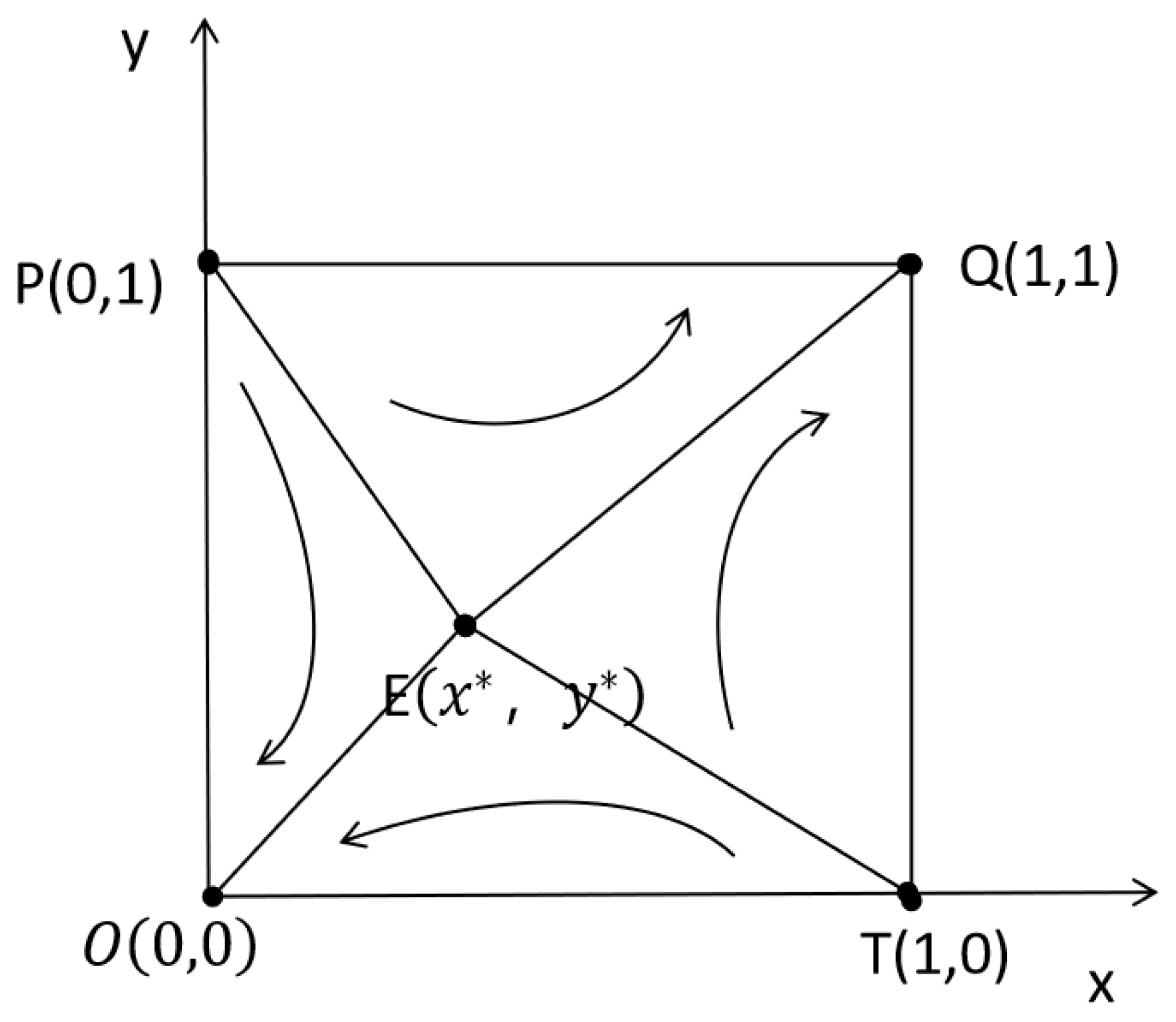
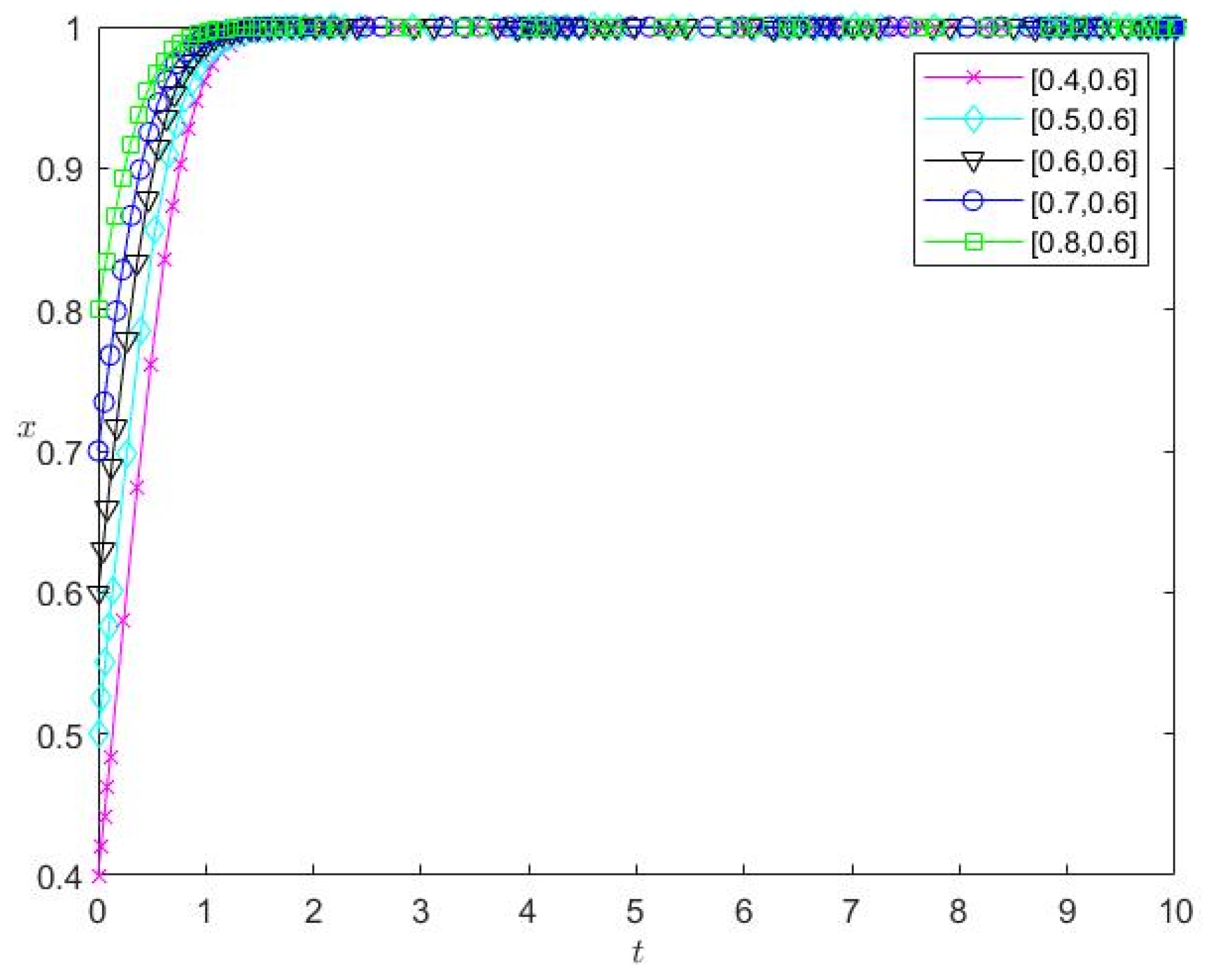
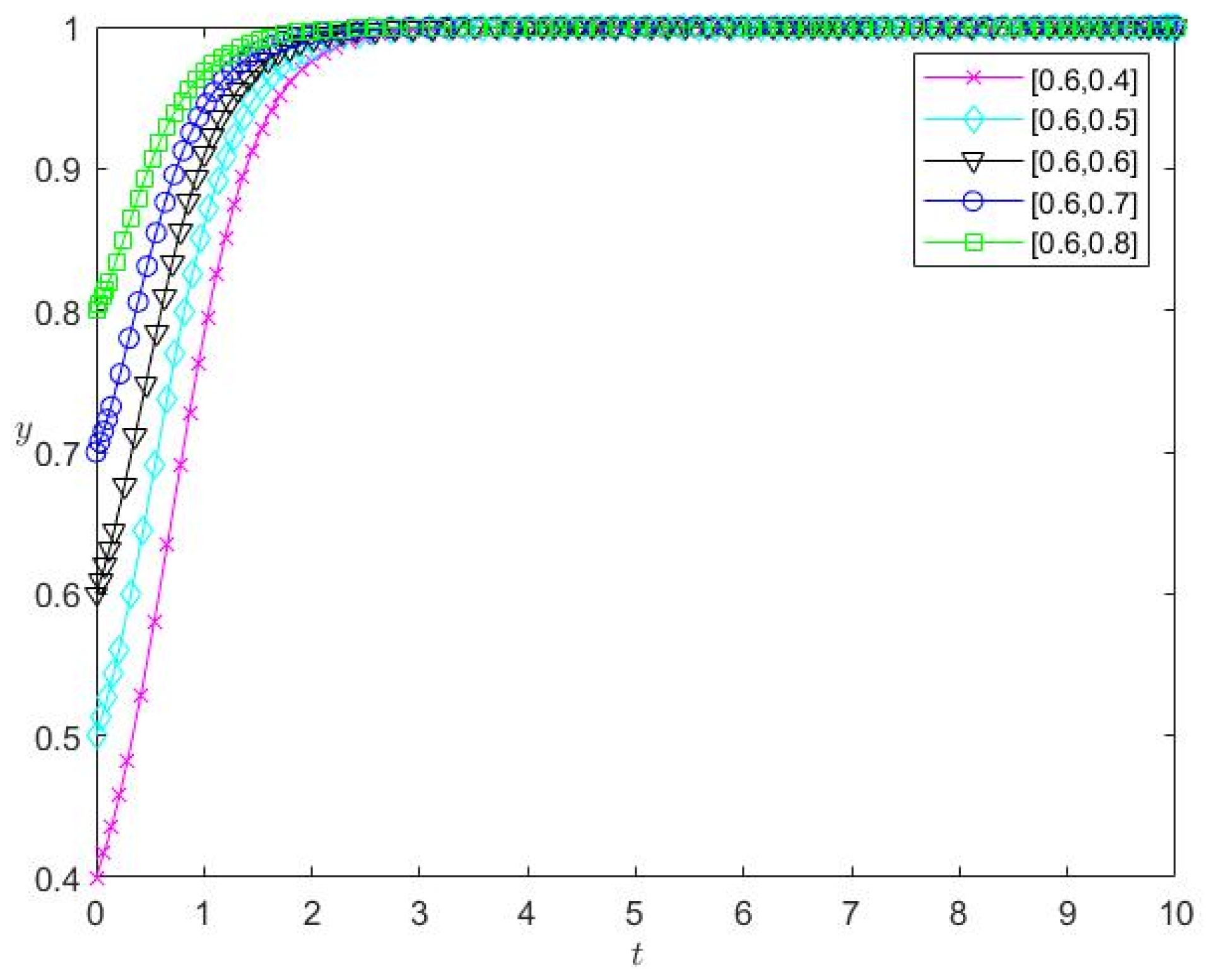
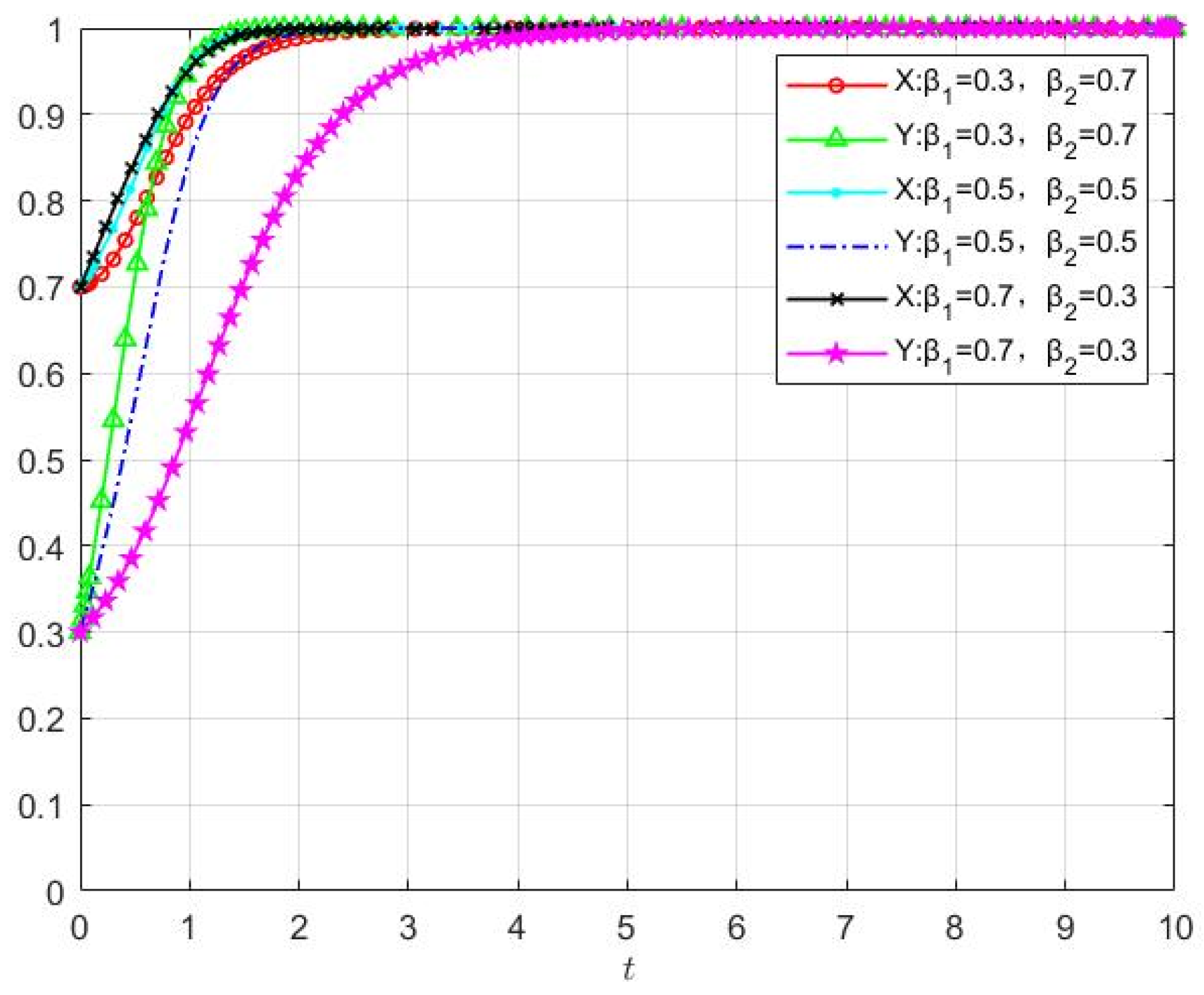
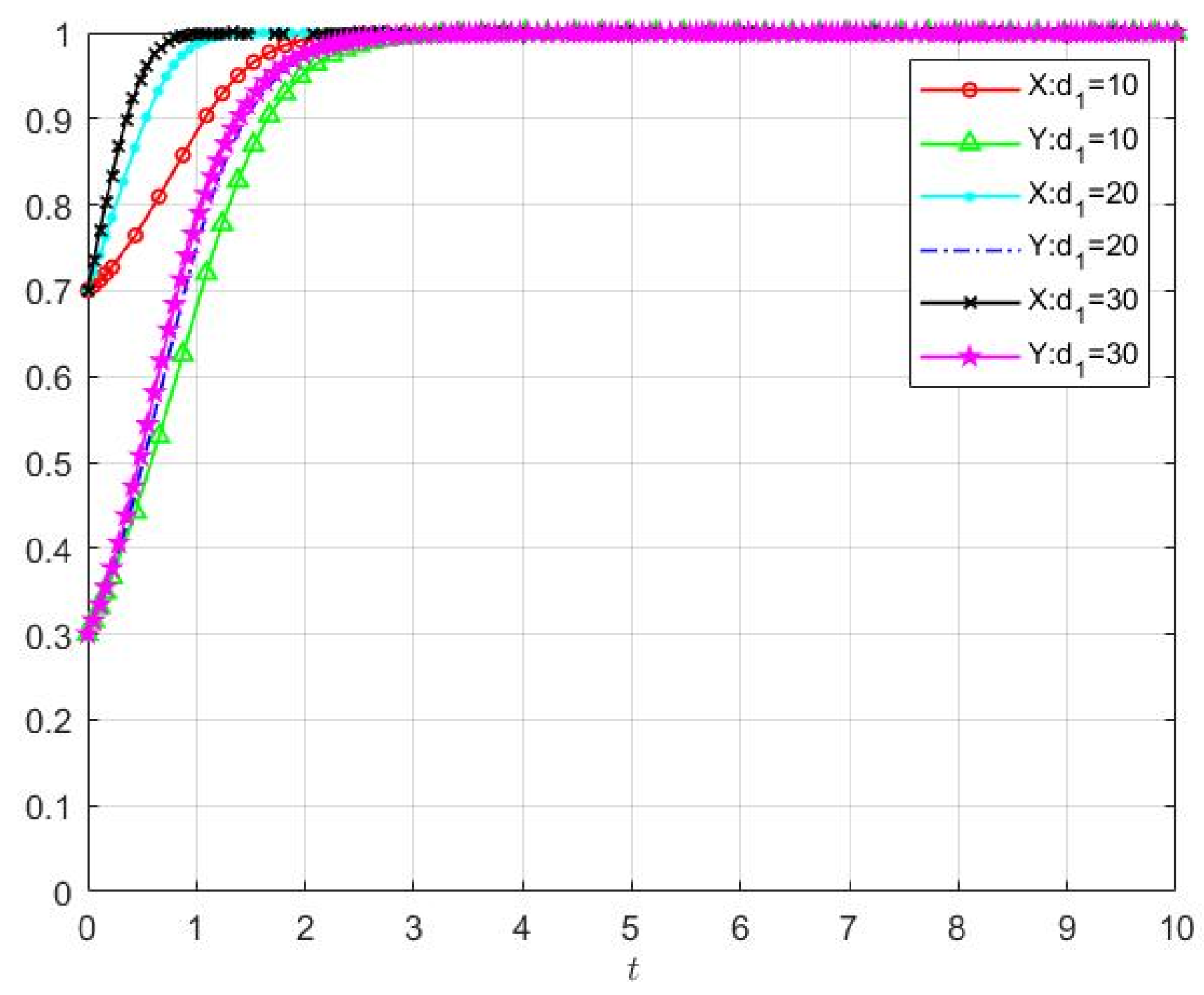
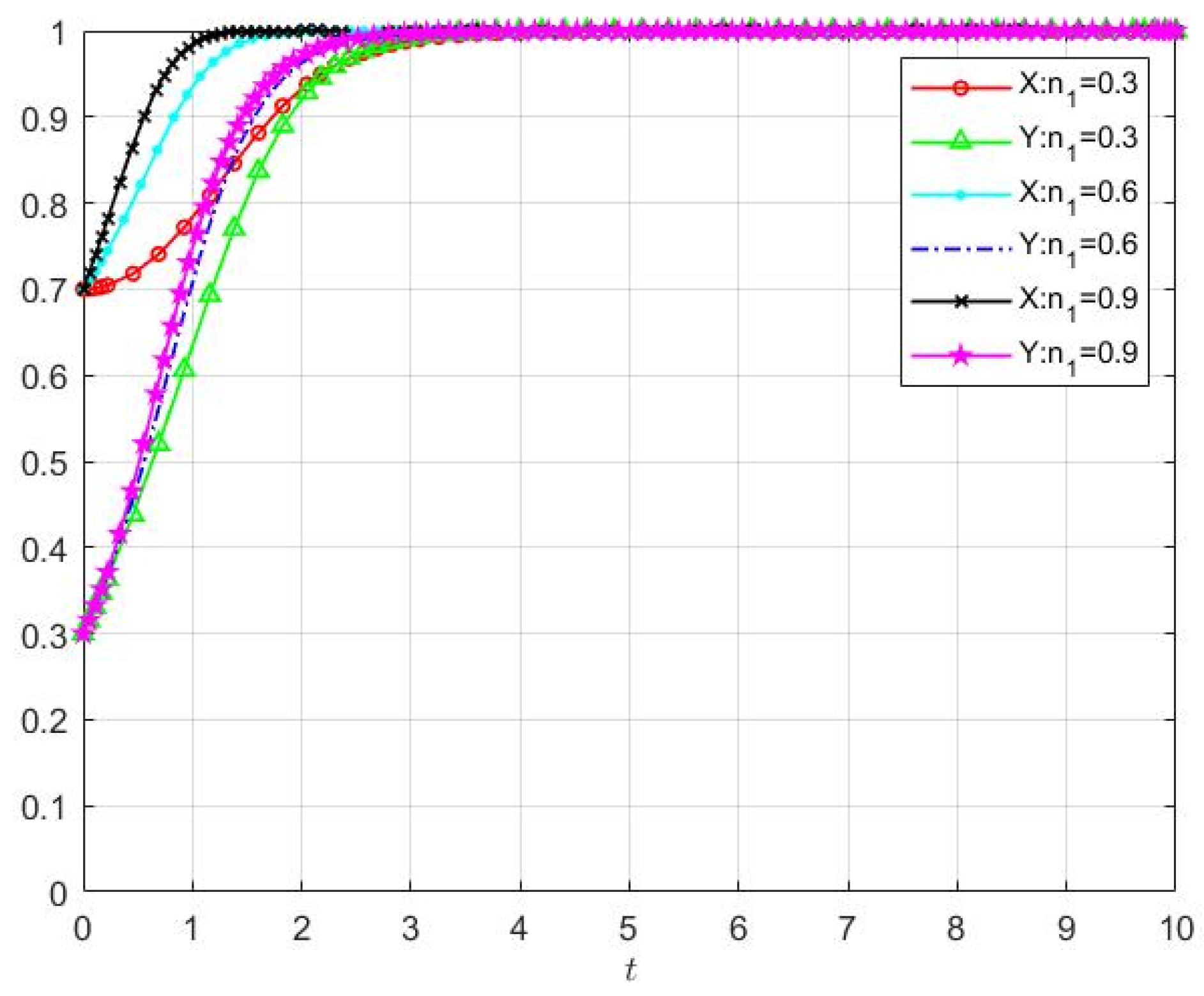
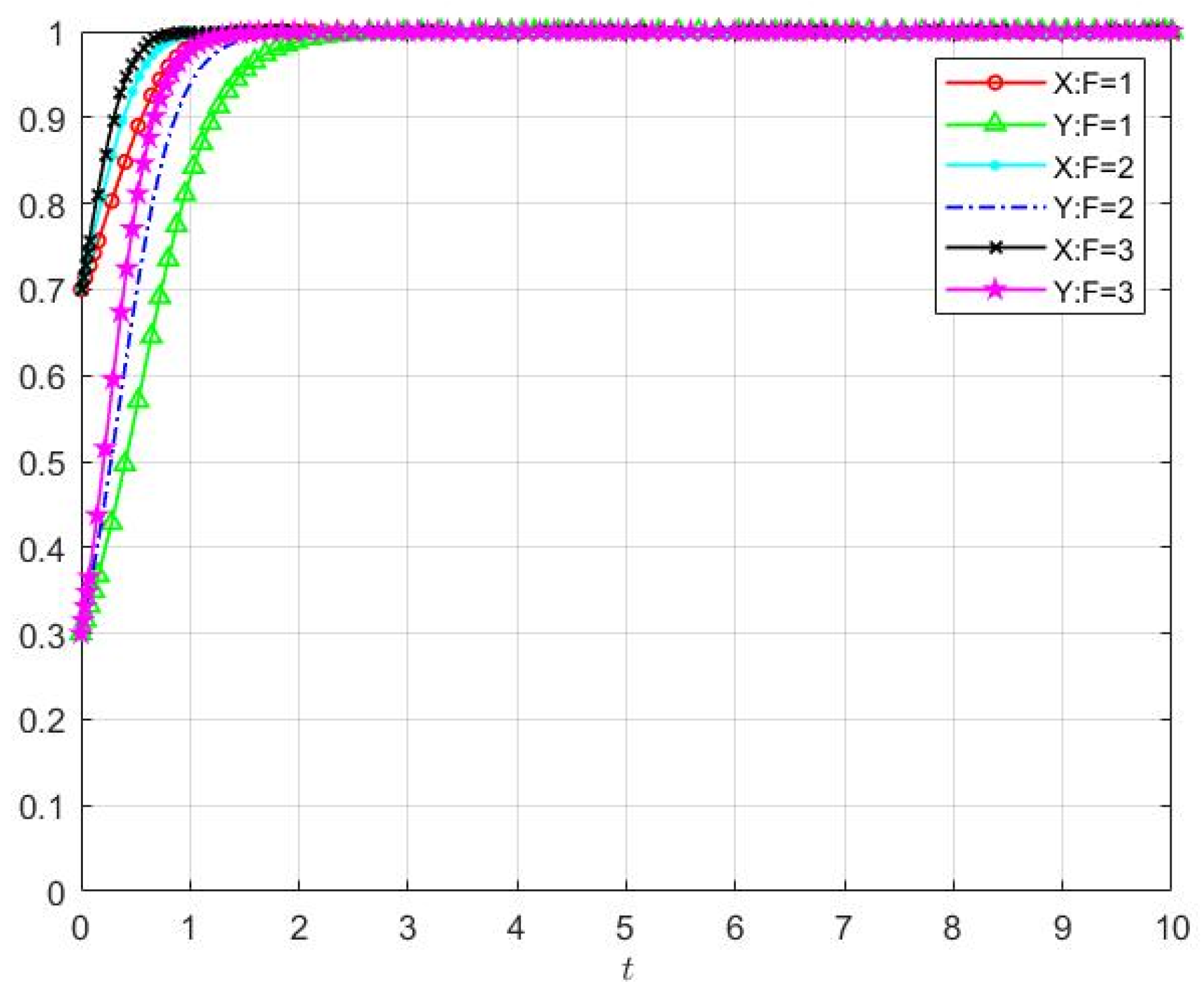
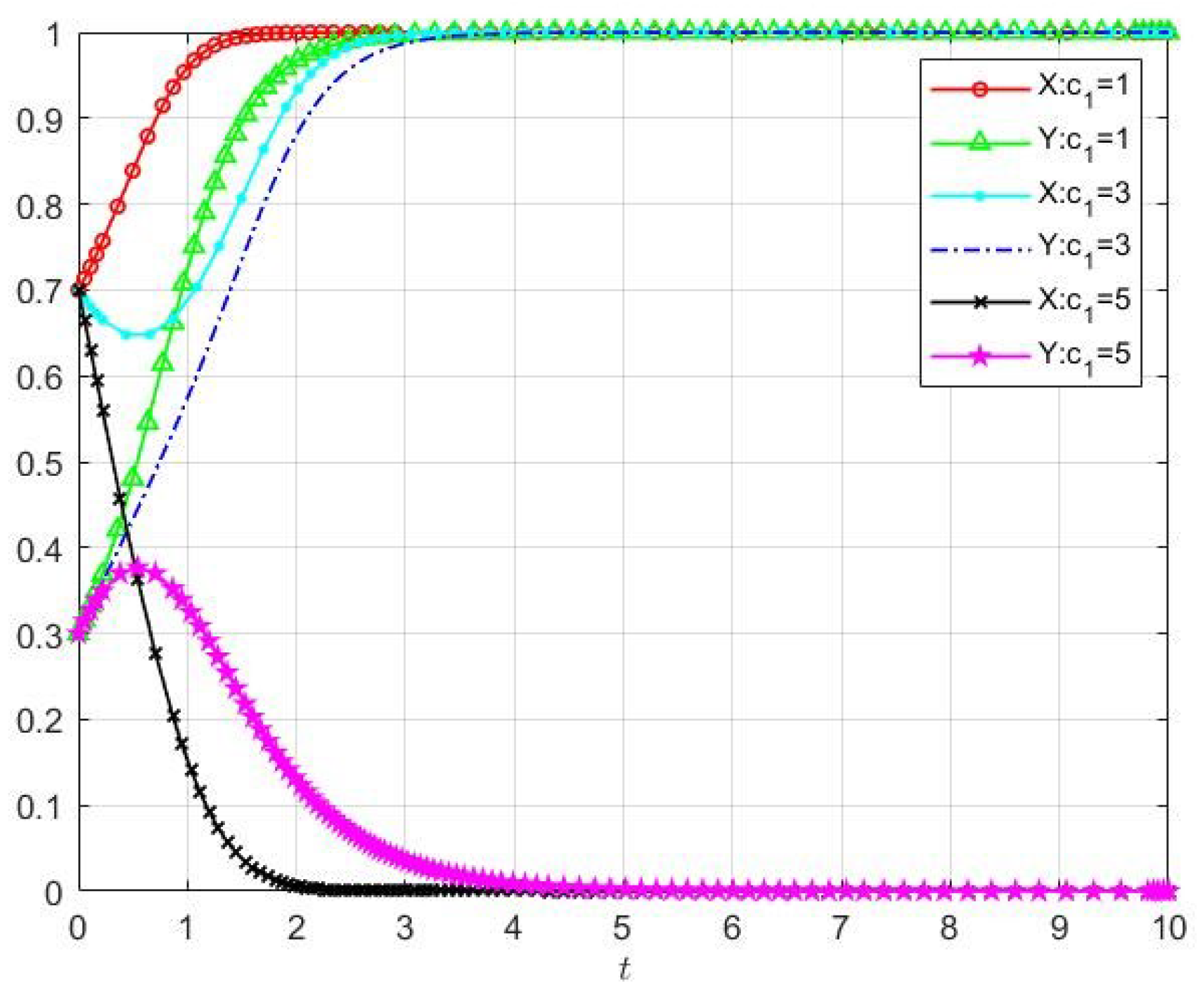
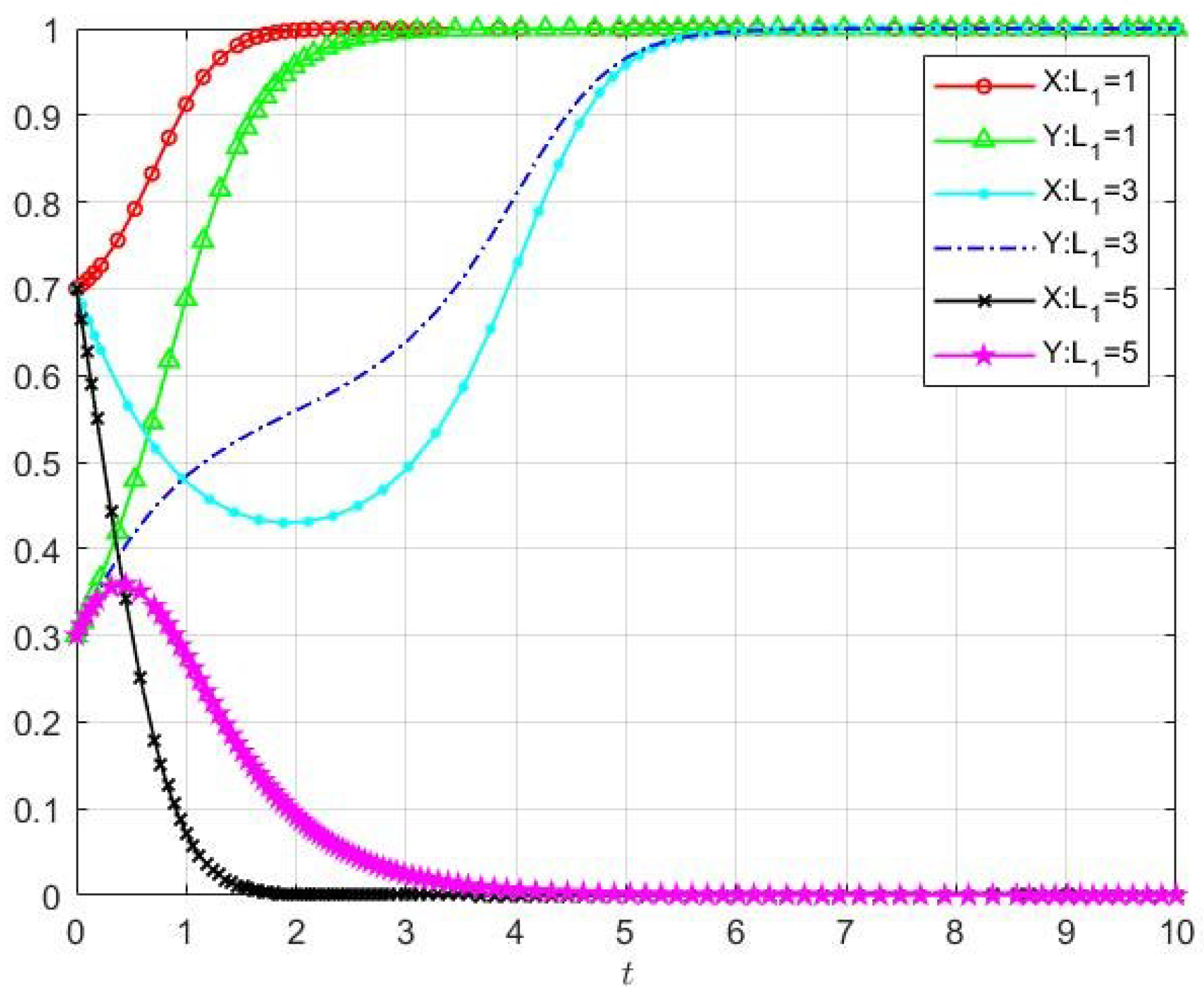
| Parameters | Meaning |
|---|---|
| Initial benefit | |
| Coefficient of shared benefit | |
| Other institutional data stock | |
| Self-learning capability | |
| Coefficient of synergistic benefit | |
| Data sharing volume | |
| Proportion of data complementarity | |
| Fixed sharing cost | |
| Loss of gain | |
| F | Free-rider penalty |
| Institution 1 | Institution 2 | |
|---|---|---|
| Share y | Not Share 1 − y | |
| Share x | , | , |
| Not Share 1 − x | , | , |
| Local Equilibrium Point | ||
|---|---|---|
| 0 |
| Equilibrium Point | Stability | ||
|---|---|---|---|
| Stability point | |||
| Unstable point | |||
| Unstable point | |||
| Stability point | |||
| / | 0 | Saddle point |
| No. | Parameter | Meaning | Assignment |
|---|---|---|---|
| 1 | Coefficient of synergistic benefit | 0.6 | |
| 2 | 0.4 | ||
| 3 | Data sharing volume | 15 | |
| 4 | 16 | ||
| 5 | Proportion of data complementarity | 0.7 | |
| 6 | 0.6 | ||
| 7 | Fixed sharing cost | 1 | |
| 8 | 1.5 | ||
| 9 | Loss of gain | 0.3 | |
| 10 | 0.4 | ||
| 11 | F | Free-rider penalty | 0.5 |
Disclaimer/Publisher’s Note: The statements, opinions and data contained in all publications are solely those of the individual author(s) and contributor(s) and not of MDPI and/or the editor(s). MDPI and/or the editor(s) disclaim responsibility for any injury to people or property resulting from any ideas, methods, instructions or products referred to in the content. |
© 2023 by the authors. Licensee MDPI, Basel, Switzerland. This article is an open access article distributed under the terms and conditions of the Creative Commons Attribution (CC BY) license (https://creativecommons.org/licenses/by/4.0/).
Share and Cite
Cao, L.; Yin, J. Research on Sharing Behavior Strategy of Cultural Heritage Institutions Based on Evolutionary Game Theory. Sustainability 2023, 15, 10192. https://doi.org/10.3390/su151310192
Cao L, Yin J. Research on Sharing Behavior Strategy of Cultural Heritage Institutions Based on Evolutionary Game Theory. Sustainability. 2023; 15(13):10192. https://doi.org/10.3390/su151310192
Chicago/Turabian StyleCao, Ling, and Jie Yin. 2023. "Research on Sharing Behavior Strategy of Cultural Heritage Institutions Based on Evolutionary Game Theory" Sustainability 15, no. 13: 10192. https://doi.org/10.3390/su151310192
APA StyleCao, L., & Yin, J. (2023). Research on Sharing Behavior Strategy of Cultural Heritage Institutions Based on Evolutionary Game Theory. Sustainability, 15(13), 10192. https://doi.org/10.3390/su151310192





